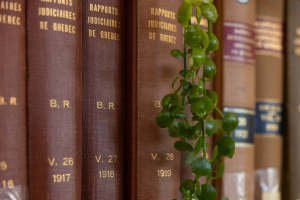Last year, I had the incredible opportunity of spending five weeks in Port Vila, Vanuatu, working on a research project to evaluate the impact of free access to law in the Pacific Islands.
While spending part of my days at the Law Faculty of the University of the Pacific(the other part I spent at the beach), I came to realize that most academics present were working in the Pacific Languages Unit, another teaching program based at the Emalus Campus of the University. Linguists, anthropologists and ethnologists have undertaken the large task of deciphering, writing down and analyzing some of the approximately 110 different languages that are still spoken by the 215,000 Ni-Vanuatu. With an average of 1,700 speakers for each language in 1996, Vanuatu has the world record for language density.
Apart from the beaches, the reason for the recent scientific interest in the numerous languages of this otherwise unknown archipelago is that many of them are at risk of disappearing. Some, such as Ifo, have already become extinct. Others, like Araki, will die in the years to come along with village elders. Young people instead choose to speak Bislama, a English-based Creole that is more widely disseminated. Many inhabitants also speak either English or French, a legacy of the British-French Condominium under which these islands were ruled for several decades.
This depressing reality is the most obvious sign that the once vibrant Ni-Vanuatu cultures are dying—not from a slowly evolving cancer, but from a dazzling flesh-eating disease. We cannot even take the comforting position that this phenomenon is limited to a few distant islands, because it is symptomatic in a large number of countries. This is not even limited to the developing world. Native American Indians are in the same situation. I personally live only a few kilometers from lands granted to the Mohawk Nation and can tell you that aside from a sign near the town hall, you would never guess that Mohawks have their own language.
Although language is the most visible component of cultural identity, the arts are another universally recognized reflection of a culture. (Hollywood movie producers show their “concern” for this by trying to convince us that file sharing is a major threat to culture!) But for French Canadians like me, law can be also be added to that list. When the British Crown granted the Act of Quebec in 1774, it not only allowed French Canadians to keep their language and religion, but also their legal system (at least in private matters). Without this document, the French culture would have certainly declined and maybe disappeared from North America over the next two centuries. It is a paradox that the Act of Quebec sprang from the troubled years preceding the birth of our giant neighbor, which is now the biggest threat to our culture. Still, our ancestors managed to keep their own law accounts for the preservation of such legal concepts as unjust enrichment or the obligation to assist a person in danger. The evolution of these laws through a few centuries of intellectual isolation has uniquely shaped our legal system and continuously reflects the values of the people of Quebec. In the end, although the French Canadian accent is more often associated with our cultural identity, our dual legal system (common law / civil law) undoubtedly contributes to it.
If you admit that legal systems are subcomponents of cultures, there is no question that their diversity should be protected, or at least promoted. Unfortunately, the trend has been going in the opposite direction for a long time. Many legal systems have disappeared with the rise of moderns states. Many more vanished during the colonial era, as it spread common law and civil law all around the globe. But more recently, it is the lack of accessibility in a period characterized by the free flow of information that is causing most of the damages to legal diversity. While the laws and customs of many countries in the developing world are still difficult to find at all, especially in electronic forms, the legal documents that are the most easily accessible on the Internet receive unprecedented attention. For example, all across French-speaking Western Africa, French jurisprudence is more often cited than local law. This can be explained by the simple fact that local decisions are generally impossible to access. In Burkina Faso, the only remaining copies of historical decisions from the Cour de Cassation are piled under a staircase (at least they were in 2004 when I last visited the building). In contrast, every decision rendered since 1989 from the equivalent French court is freely accessible online on Legifrance, and all those published in the court bulletins are also available up to 1960. Another illustration of this problem is the ever-increasing number of citations of the decisions of the European courts at the international level. Without any doubt, the new leadership taken by these institutions, particularly in the field of humanitarian law, is a major factor in this phenomenon. But the fact that many of these decisions are freely distributed online in 23 different languages cannot be ignored either.
These two illustrations quickly help to expose a fact that is becoming harder and harder to deny: the accessibility of legal information influences what the law is and how it evolves. It does so internally by generating competition for authority among the various recognized legal sources. It does so externally by facilitating the incorporation of foreign legal concepts or doctrines that are more effectively disseminated. The examples given above also underline the crucial role played by the Internet and free access to law in this equation. When it comes to finding legal material to cite, jurists prefer to search libraries, rather than underneath staircases. They prefer to browse online instead of walking among alleys of books. They prefer freely accessible websites to highly expensive databases. The goal here is not to openly attack the prevalent legal theories, beliefs in the hierarchy of norms, or the importance of conducting all-inclusive legal research. But these findings imply that jurists do not hesitate to bend the pillars of legal positivism when confronted with necessity.
That brings me back to Vanuatu and the Pacific Islands. In this region, most countries acquired their independence after the end of the Second World War, and inherited the common law as the basis for their own legal system. Local rules of conflict resolution were not totally annihilated by colonization, but were instead relegated to unofficial proceedings or trivial matters. With independence, we could hope that the local, customary rules that remain significant in the modern world would somehow resurface in a system of judge-made law. But this is wishful thinking that ignores the accessibility issue. First, customary law being unwritten by definition, its accessibility was hindered right from the start. Second, for years judges, lawyers and other legal practitioners from the Pacific almost exclusively had access to case reports printed in the United Kingdom. A few local initiatives at case reporting did occur over the last few decades, but the coverage was irregular and far too small to sustain a modern state’s appetite for precedents. Third, it should be added that many foreign judges who have never been confronted with the local customs and traditions remained in position up to very recently. For these reasons, jurists from the Pacific continued to apply the latest British judgments as if it was the law in force in their own countries.
Fortunately, the Internet has brought changes in this regard. In 1997, the law library of the University of the South Pacific started to publish online cases collected from many of the jurisdictions of the region. The database grew steadily and around 2001 the Pacific Legal Information Institute (PacLII) was created in order to expand the experiment. Today, PacLII publishes more than 30,000 cases from 15 different Pacific island countries, in addition to legislative and treaty material. For most of these countries, PacLII is the sole point of access to national legal information.
In the course of my stay there I compiled the usage statistics of the PacLII website. My initial goal was to determine if local cases are downloaded by locals or instead by international users looking for foreign legal information. It turned out that five Pacific island countries are intensive users of the decisions disseminated on PacLII: Fiji (71); Vanuatu (62); Samoa (47); Kiribati (33); and Salomon Islands (21). (The number between parenthesis is the number of actual decision files downloaded for 1,000 inhabitants in 2007.) Not surprisingly, those five countries are the ones for which PacLII has the more comprehensive databases. The only exception is Papua New Guinea, where an alternative national publisher also provide online access to cases.
More relevant for legal diversity are the numbers that came out of my analysis of citations included inside the local judgments rendered over the period 1997-2007. In parallel with the development of PacLII, citations of national decisions increased by 42% in the five countries already mentioned. Citations of regional decisions (citations from other Pacific Islands countries) increased by 462%, although they still occur only occasionally. In comparison, those percentages stagnate in the other nine countries not using PacLII with equivalent enthusiasm. (Papua New Guinea is excluded here because the national access provider is having its own influence.)
Those numbers indicate that the online dissemination of Pacific Islands cases had a noticeable impact on the legal system of five countries. While it is still too early to write about the creation of a Pacific jurisprudence, there is no doubt that local decisions are slowly but surely replacing foreign cases as the primary source of precedents in those countries. It appears that free access to law has finally reversed the long established trend of ever increasing foreign legal influence in the region.
Even if this new phenomenon is particularly acute in Vanuatu itself, the dying legal cultures of this archipelago will certainly not be saved by this achievement alone. Many specificities of the customary dispute resolution mechanisms originating in the area must have already disappeared definitively, some for the better, some for the worse. Nevertheless, Ni-Vanuatu now possess a means to promote their own vision of what the law is and how it should be implemented. If uses of this new tool do not succeed in salvaging pieces from their traditional legal cultures, at least it should help them building a new one.
Original document on law.cornell.edu.









